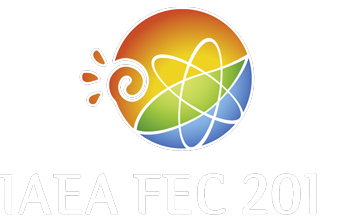Speaker
Dr
juan knaster
(IFMIF/EVEDA)
Description
IFMIF, the International Fusion Materials Irradiation Facility, presently in its Engineering Validation and Engineering Design Activities (EVEDA) phase under the Broader Approach Agreement, will allow accelerated testing of structural materials with fusion relevant neutrons at >20dpa/year in 500cm3. IFMIF consists of two 125 mA and 40 MeV D+ linear accelerators operating in CW mode. The concurrent beam lines impact on a liquid lithium target with a 200mm 50mm beam cross section. The target consists of a 25mm 1mm thick liquid lithium screen flowing at 15m/s and 250°C channelled by a R250mm concave RAFM backplate. The suitable neutron flux generated in the forward direction will irradiate 12 test capsules housing around 1000 small specimens independently cooled with helium gas. The Engineering Design Activity (EDA) phase of IFMIF was successfully accomplished within the allocated time. The Engineering Validation Activity (EVA) phase has focused on validating the Accelerator Facility, the Target Facility and the Test Facility with the construction of various prototypes. The ELTL has successfully demonstrated the long term stability of a lithium flow under IFMIF nominal operational conditions with 25 days continuous operation in Oarai (JAEA) at 250°C and 15m/s within 1mm free surface fluctuations. A full-scale prototype of the High Flux Test Module has been successfully tested in the HELOKA loop (KIT Karlsruhe) demonstrating the feasibility of the uniformity in the temperature selected for the specimen set irradiated in each capsule. LIPAc, presently under installation and commissioning, will validate the concept of IFMIF Accelerators with a D+ beam of 125mA and 9MeV. The commissioning of the H+/D+ beams in Rokkasho Fusion Institute at 100keV was concluded early 2016; the commissioning of the 5MeV beam is to follow till early 2017. The 9MeV D+ beam will be achieved with a superconducting cryomodule during 2018. The realisation of a fusion relevant neutron source is a necessary step for the successful development of fusion. The stable progress achieved in this final EVEDA phase has ruled out technical concerns and potential showstoppers raised in the past. In the light of costs, which are unquestionably marginal to those of a fusion plant, a situation has emerged where soon steps towards constructing a Li(d,xn) fusion relevant neutron source could be taken.
| Country or International Organization | Japan |
|---|---|
| Paper Number | OV/4-1 |
Author
Dr
juan knaster
(IFMIF/EVEDA)

